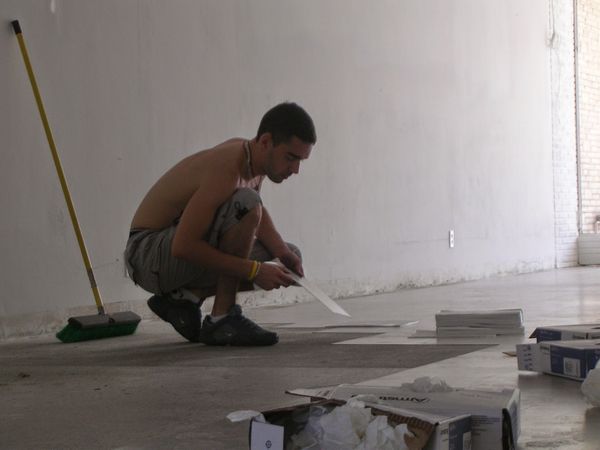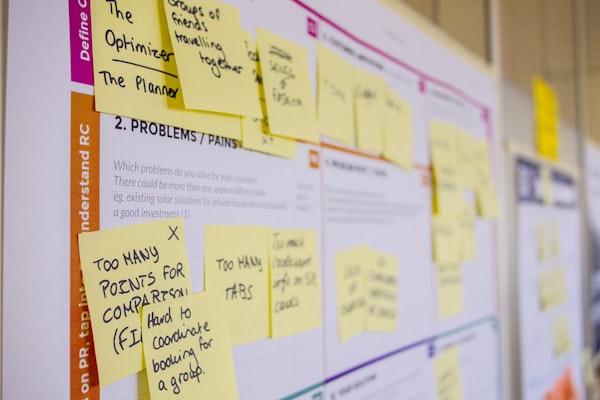As part of the Write of Passage #5 course I recently joined (best personal development pandemic-decision ever), I have been reflecting on my career and how my role has evolved to what it is today. What is my main personality trait or way of thinking that allowed me to grow into my roles and feel a sense of achievement, even if I am only a third through my professional career time?
I feel very grateful to have such a rewarding job but I wanted to dig further and analyse why I feel that way. By sharing my experience, I felt like writing about "leadership in the digital space", as this is where I am today. However, I quickly realised this applies to any level in any sector. Even if you are in a junior role (similar to when I started 15 years ago), the following ideas will help you gain confidence and keep a positive attitude to grow your job wherever you want to take it.
The discovery mindset
Back 20 years ago during my engineering degree in telecom and digital, the variety of classes, topics and projects taught me to adapt and to enjoy the learning process. As we were confronted with research projects, we had to apply the theoretical concepts and discover the practical applications of what we had learnt.
Building prototypes with our hands and having to present the end result to an audience really helped me get my head around the “learning > thinking > applying > showing” concept. Whether it was building an electric circuit board for a traffic light system, coding a game algorithm in Pascal or generating a frequency modulator to simulate mobile phone signals, we did not have much to question. Every time we were given such projects, we just had to learn, analyse and deliver in a few days. We just had to do it and put 100% into it (yes, especially the evening before!)
I realise today that this continues throughout a professional career. Most of what we do is learn “on the job”. From higher education, you learn concepts and principles to adapt, but every situation is so different that you can never learn all possible responses. On the technical side, I recently had to learn about kubernetes. It’s not something you learn with a degree, so I applied the same learning concepts as my students' years and discovered it by “just doing it”. I found a real-life application and built a proof of concept before sharing the findings. On the people side, there is no class to teach us how to lead a team during a pandemic lockdown. We were all faced with it and had to do it.
I believe that this is actually the most exciting part of our daily jobs. When we are confronted with a new challenge or do something new, when we apply a concept and build something real, we understand it better, reflect on it and share with others.
Until a few weeks ago, I didn’t realise this was called the "Growth mindset”. Having read more about it, it’s pretty much all in there! To develop new skills, grow into a more senior role or lead your team to success, you need to enjoy the process of getting there, not the outcome.
We are all driven by the constant dopamine hit of social media but real-life experiences are so much more rewarding. In my role, I am looking for opportunities to try something new. I remember the adrenaline rush of my first public speaking engagement: our marketing team had secured a slot for talk at a conference, but no-one was around or available… I was the first one to jump and say “I’ll do it”!
Similarly when we decided to embark on a new project to get ISO compliance certifications in our startup, none of us had done it before and I was already busy enough managing a team, projects, clients.... It doesn’t matter! We embraced the opportunity: a few of us read about the ISO standards, went on a 3-day training course and just delivered it all in a few weeks. By doing it ourselves, we learnt so much that we have now turned it into a service we sell to clients!
The lesson here is that by discovering new ideas and working through challenges outside of your comfort zone, you will never be bored in your role and it will give you a unique experience that will open new doors in the future.
But should you really say “yes” to any new challenge presented to you?
“It's not my job”
I can understand some of my colleagues hinting at the “imposter syndrome”, thinking that it would be disrespectful to jump into someone else’s role. Or that they don’t feel they could deliver a project because they don’t know much about a topic or did not get trained on new software.
Others are more reluctant and could complain with feedback such as “It’s not my job” or “You are paying someone else to do that”. I strongly disagree with that mindset. There are of course valid excuses if you are tied on another urgent project or for health & safety reasons (disclaimer: you should not drive that forklift truck if you are not certified!)
I remember my first job experience, when I left France for the USA at 23, straight out of my French studies with a very basic level of English. I landed in Florida and joined an eCommerce startup as a web developer, sitting right next to the CEO (Viktor), just the two of us in a tiny office! On my first day, he was busy on the phone when the other line rang. Viktor looked at me and gave me a sign to pick up the phone. Did I have a chance to say “Sorry, I am just a developer, not a customer service assistant”? Nope! I just did it. I took a message, wrote down the number and passed it on. It boosted my confidence and made me realise how enjoyable that feeling of doing something for the first time is.
During this year-long internship, I ended up probably doing only 30% of the technical work as a web developer I was hired for. I got involved with sales, SEO, inventory management, payment reconciliation, product returns, supplier disputes, international deliveries and customs, hiring as the team expanded… even tiled the new shop floor!
I learnt so much about all aspects of a growing startup, all the ins-and-outs about eCommerce and running a business, it was a life-changing experience and I kept that mindset throughout.
As most of us are working in a team, the shared goal of a company is to deliver value for its clients. Everyone in the team is working towards that same goal, and no one can do it alone. This is why I don’t understand people claiming “it’s not my job”. If you have some spare time, you should BEG to get involved in projects outside your core area of competencies.
Just Do It
Every day we have to make decisions and no teacher taught us what the answers are. You have to remember that no-one executes perfectly 100% of the time. No one has a crystal ball to predict how things will turn out. But by embracing every new challenge as an opportunity to learn, my approach is to not overthink it. This brings the risk of reaching an “analysis-paralysis” and never coming up with a plan of action. To find the balance between recklessness and inaction, here is my practical 3 steps approach when you are faced with a new challenge at work:
LISTEN
- Make sure you understand the request and the other party fully: what are they thinking or expecting;
- If multiple parties are involved, get everyone’s input. Act as the mediator to make sure no-one is left out or will come crash the party at the last minute;
This often happens between our team and our clients, you have to try not to make one work for the other, but both ways!
ANALYSE
- What are the different options presented to me? What are the best practices? What is my gut feeling? Draw from previous experience: what worked well last time, what did you learn from anything that didn’t turn out the way you expected?
- Brainstorm or ask for help from other colleagues or expert - I usually refer legal queries to someone who has more experience in this field has it could have a bigger impact;
- Find the balance that will satisfy most. You will often face conflicting possibilities between your team and your clients, or between a client and your supplier… What’s the most likely outcome for everyone to get something positive out of it? Maybe not full solution but some progress towards it;
- Keep your integrity: make sure you don’t cross any red lines and aim to make someone else the hero. I will usually prefer doing something that will help someone else feel better or learn from it, do what’s best for others before my own;
As long as you cover off the main risks and you have some sort of a plan, it’s time to ACT.
ACT
You just have to trust yourself: as long as you try your best, you visualise what the best outcome could be, you will gain something. Whether it is a success and you can repeat it again in the future, or a failure and you can learn from it, JUST DO IT
Following these steps, experimenting, and just doing it anyway may be your way to grow your career. If you want to grow into your role or gain seniority to manage a wider team, those experiences will be an invaluable asset that will make you a better leader. Your future self will thank you for it and you will feel better for just trying.



